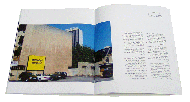![]()
Andrea Schwarzkopf
Roland Kreuzer had the idea of translating these questions into a multitude of languages, and this idea formed the basis for his project weltfragen. Following the success of the project in a number of European cities, an interdisciplinary symposium was organised in Berlin in 2001 to discuss the four questions. One thing that the symposium made clear was that there are no easy answers to the questions, and this was one reason why we wanted to look beyond a European context for different ways of thinking about the issues.
The Lebanon was seen by Europeans for many centuries - and is seen by us today - as a land where an open society flourishes. It was the country of the Phoenicians, a scholarly people whose work forged the way for the exchange of knowledge as well as commercial goods. This perception was lost to some extent in the years of the civil war, when Beirut suffered a similar fate to Berlin: the city was divided, and thus the whole country. But that is now in the past, and many walls that separated us have fallen. We have been welcomed by the people of Lebanon with enthusiasm and friendship, and we are happy and grateful for their willingness to share their interest with us. Both Roland Kreuzer and I would like to thank you and them for this. We hope that the weltfragen project will contribute to the new exchange of ideas taking place between your countries and ours. The countries of the Middle East, as this part of the world is known in Europe, are filled with a deep religious awareness in which values are clearly defined. I think that our discussions today on Kant's questions will reflect this awareness.
Immanuel Kant himself gave expression to his religious feeling with the words: "There are two things which fill my soul with ever greater wonder and awe the more I meditate upon them: one is the starry heaven above me, the other is the moral law within me."
Jacques Derrida created the artificial word différance, deriving from the French verb différer. Différer has two meanings. One is the action of delaying or putting off something (English to defer). In economic terms, this implies a calculation, a diversion, an exchange or a representation. But it also means not identical yet recognisable (in the English sense of to differ). Both deferring and differing imply a simultaneous connection and disconnection of two things in time or space. In Derrida's sense, this reveals the impossibility of truly fixing meaning.
In his book De anima (On the soul), Aristotle defines harmony as a kind of combination of opposing forces. The points of view of our speakers today will not be identical, but they will certainly be recognisable. I hope that today's event will prove to be a successful experiment and a successful combination of opposing forces. The German poet Johann Wolfgang Goethe said: "It is not always necessary for the truth to be made manifest; it is enough that its spirit should be all around us, creating harmony by its mere presence".
Andrea Schwarzkopf
Kant enlightens
© Schwarzkopf 2006
edited by Andrea Schwarzkopf & Roland Kreuzer
Berlin 2006
With contributions of Sélim Abou, Henry Cremona, Richard C. Dean, Roland Kreuzer, Fitnat Messaiké, Angelika Neuwirth, Doumit Salameh, Ridwan al-Sayyid, Andrea Schwarzkopf, Georges Zeynati.
English, German and Arabic, 80 pages, 50 photographs., 21 x 25 cm, costs including delivery: 10 €

